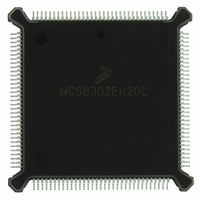MC68302EH20C Freescale Semiconductor, MC68302EH20C Datasheet - Page 65

MC68302EH20C
Manufacturer Part Number
MC68302EH20C
Description
IC MPU MULTI-PROTOCOL 132-PQFP
Manufacturer
Freescale Semiconductor
Datasheets
1.MC68302AG20C.pdf
(4 pages)
2.MC68302AG20C.pdf
(2 pages)
3.MC68302AG20C.pdf
(13 pages)
4.MC68302EH20C.pdf
(481 pages)
Specifications of MC68302EH20C
Processor Type
M683xx 32-Bit
Speed
20MHz
Voltage
5V
Mounting Type
Surface Mount
Package / Case
132-MQFP, 132-PQFP
Family Name
M68000
Device Core
ColdFire
Device Core Size
32b
Frequency (max)
20MHz
Instruction Set Architecture
RISC
Supply Voltage 1 (typ)
5V
Operating Temp Range
0C to 70C
Operating Temperature Classification
Commercial
Mounting
Surface Mount
Pin Count
132
Package Type
PQFP
Lead Free Status / RoHS Status
Lead free / RoHS Compliant
Features
-
Lead Free Status / Rohs Status
Compliant
Available stocks
Company
Part Number
Manufacturer
Quantity
Price
Company:
Part Number:
MC68302EH20C
Manufacturer:
Freescale Semiconductor
Quantity:
10 000
Part Number:
MC68302EH20C
Manufacturer:
FREESCALE
Quantity:
20 000
Company:
Part Number:
MC68302EH20CB1
Manufacturer:
Freescale Semiconductor
Quantity:
10 000
Company:
Part Number:
MC68302EH20CR2
Manufacturer:
Freescale Semiconductor
Quantity:
10 000
- MC68302AG20C PDF datasheet
- MC68302AG20C PDF datasheet #2
- MC68302AG20C PDF datasheet #3
- MC68302EH20C PDF datasheet #4
- Current page: 65 of 481
- Download datasheet (2Mb)
3.1.7.1 Reset
Upon an external chip reset, the IDMA channel immediately aborts the channel operation,
returns to the idle state, and clears CSR and CMR (including the STR bit). If a bus cycle is
in progress when reset is detected, the cycle is terminated, the control and address/data
pins are three-stated, and bus ownership is released. The IDMA can also be reset by RST
in the CMR.
3.1.7.2 Bus Error
When a fatal error occurs during a bus cycle, a bus error exception is used to abort the cycle
and systematically terminate that channel's operation. The IDMA terminates the current bus
cycle, signals an error in the CSR, and generates a maskable interrupt. The IDMA clears
STR and waits for a restart of the channel and the negation of BERR before starting any new
bus cycles.
3.1.7.3 Halt
IDMA transfer operation may be suspended at any time by asserting HALT to the IDMA. In
response, any bus cycle in progress is completed (after DTACK is asserted), and bus own-
ership is released. No further bus cycles will be started while HALT remains asserted. When
the IDMA is in the middle of an operand transfer when halted and HALT is subsequently ne-
gated, and if a new transfer request is pending, then IDMA will arbitrate for the bus and con-
tinue normal operation.
3.1.7.4 Relinquish and Retry
When HALT and BERR are asserted during a bus cycle, the IDMA terminates the bus cycle,
releases the bus, and suspends any further operation until these signals are negated. When
HALT and BERR are negated, the IDMA will arbitrate for the bus, re-execute the interrupted
bus cycle, and continue normal operation.
3.2 INTERRUPT CONTROLLER
The IMP interrupt controller accepts and prioritizes both internal and external interrupt re-
quests and generates a vector number during the CPU interrupt acknowledge cycle. Inter-
rupt nesting is also provided so that an interrupt service routine of a lower priority interrupt
may be suspended by a higher priority interrupt request. The interrupt controller block dia-
gram is shown in Figure 3-2.
The on-chip interrupt controller has the following features:
MOTOROLA
• Two Operational Modes: Normal and Dedicated
• Eighteen Prioritized Interrupt Sources (Internal and External)
• A Fully Nested Interrupt Environment
• Unique Vector Number for Each Internal/External Source Generated
• Three Interrupt Request and Interrupt Acknowledge Pairs
Any data that was previously read from the source into the DHR
will be lost.
MC68302 USER’S MANUAL
NOTE
System Integration Block (SIB)
3-15
Related parts for MC68302EH20C
Image
Part Number
Description
Manufacturer
Datasheet
Request
R
Part Number:
Description:
Manufacturer:
Freescale Semiconductor, Inc
Datasheet:

Part Number:
Description:
MC68302 Configuring the Chip Selects on the MC68302
Manufacturer:
Motorola / Freescale Semiconductor

Part Number:
Description:
MC68302 Design Concept - Expanding Interrupts on the MC68302
Manufacturer:
Motorola / Freescale Semiconductor

Part Number:
Description:
MC68302 MC68302 Adapting a WAN Controller to a LAN Environment
Manufacturer:
Motorola / Freescale Semiconductor

Part Number:
Description:
MC68302 EKB Applications - Power Measurements on the MC68302
Manufacturer:
Motorola / Freescale Semiconductor

Part Number:
Description:
MC68302 Interfacing the MC68020 to a Slave MC68302
Manufacturer:
Motorola / Freescale Semiconductor

Part Number:
Description:
MC68302 MC68302 Software Performance
Manufacturer:
Motorola / Freescale Semiconductor

Part Number:
Description:
MC68302 Evaluating EDX on the ADS302
Manufacturer:
Motorola / Freescale Semiconductor

Part Number:
Description:
MC68302 Design Advisory #1 - MC68SC302 Passive ISDN Protocol Engine
Manufacturer:
Motorola / Freescale Semiconductor

Part Number:
Description:
MC68302, MC68360, and MPC860 Characteristics and Design Notes for Crystal Feedback Oscillators
Manufacturer:
Motorola / Freescale Semiconductor
Part Number:
Description:
Mc68302 Integrated Multi-protocol Processor
Manufacturer:
Freescale Semiconductor, Inc
Datasheet:
Part Number:
Description:
Manufacturer:
Freescale Semiconductor, Inc
Datasheet:
Part Number:
Description:
Manufacturer:
Freescale Semiconductor, Inc
Datasheet:
Part Number:
Description:
Manufacturer:
Freescale Semiconductor, Inc
Datasheet:
Part Number:
Description:
Manufacturer:
Freescale Semiconductor, Inc
Datasheet:











